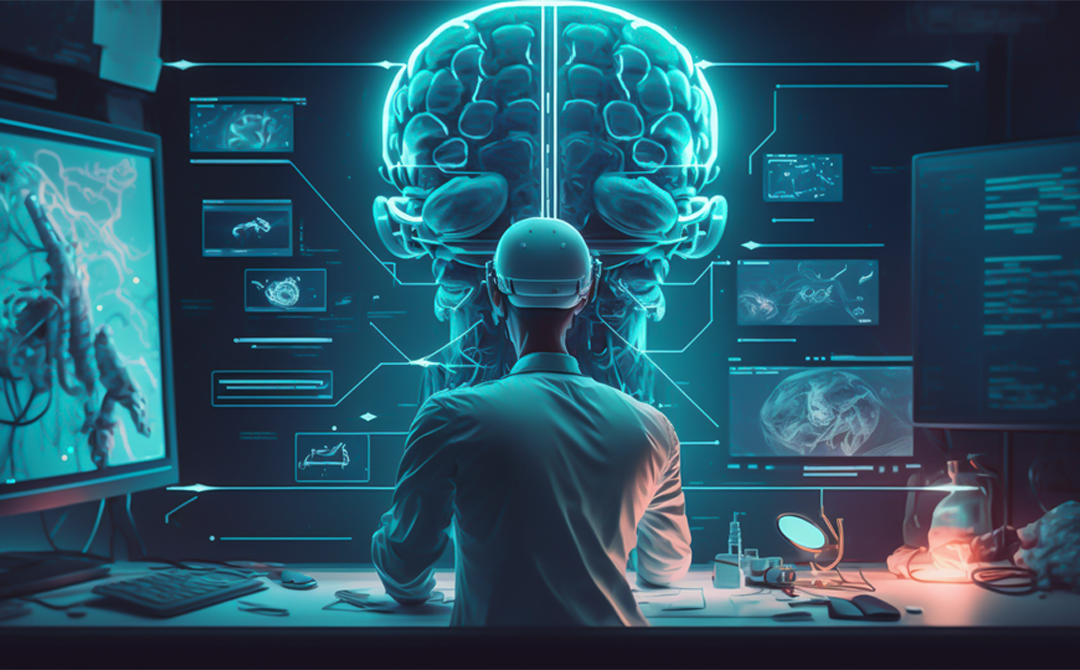
Is the next medical breakthrough not a drug or device, but an intelligent AI agent?
We all know that AI has become a powerful force in the healthcare industry. But there's a new kind of AI that's rewriting the rules: agentic AI. Unlike traditional AI that follows a set of instructions or waits for them to work, agentic AI is designed to take initiative and adapt based on what's happening around it.
This up-and-coming technology is poised to transform healthcare delivery by enhancing diagnostic capabilities, anticipating patient needs, and streamlining workflows. As we stand on the brink of this new medical frontier, Agentic AI holds immense promise in redefining the future of medicine, making healthcare more efficient, responsive, and human-centered.
In this blog, we delve deep into agentic AI’s potential in the healthcare sector, its use cases, and briefly outline its current challenges.
Understanding Agentic AI in Healthcare
Agentic AI is fundamentally built on three main pillars namely, Autonomy, continuous learning, and goal-driven behavior. It operates independently, learning from datasets and making decisions like pricing a product maximally for huge profit or mitigating unnecessary waste. Its formidable nature stems largely from its ability to think quickly and make decisions rapidly under pressure.
Though AI in the medical field has been designed to sift through data to find patterns and analyze patient information, it goes beyond that, even monitoring a patient’s vitals and providing a treatment plan based on their medical history. This is just one of the applications of agentic AI. Using a digital ecosystem of large language models (LLMs), natural language processing (NLP), and machine learning (ML), it can independently analyze medical challenges and strategize to solve them within certain boundaries.
But how do agentic AI systems make all this possible? They are built on an advanced architecture with many layers that facilitate data flow. Let’s look at the different layers below:
Technical architecture
Agentic AI systems in healthcare are built upon a layered architecture for smooth data flow, and this helps in intelligent decision-making. The different layers include:
A) Foundational data layers bring together both structured and unstructured data from electronic health records, imaging machines, and bedside monitors.
B) Agentic AI platforms then sift through these datasets, helping staff spot risks, prepare diagnoses, and suggest treatment paths.
C) Agentic AI platforms yield insights that get slotted into clinical workflows seamlessly via dashboards and alerts. Healthcare professionals can make informed decisions swiftly with this information at their disposal.
Healthcare professionals still wrestle with vast amounts of fragmented data despite a well-layered architecture, making the extraction of real value difficult. AI-native ecosystems gain prominence rapidly, becoming vital in handling healthcare data, making it decision-ready effectively across various medical domains.
The importance of AI-native data foundations for agentic AI systems in healthcare
AI-native technology is built with AI at its core, centering around its functionalities. And, AI-native data foundations are digital infrastructures that natively support and are architected for real-time data processing, integration and analysis. Together, they form a powerful ecosystem where seamless, autonomous decision-making, drawn from real-time contextual insights.
This level of decision-making can be achieved in healthcare’s AI agents by combining clinical, claims, policy, and patient-generated data into a unified framework, so these data foundations help the agents make more accurate decisions. Plus, we can embed healthcare policies and regulations directly into the data layer. This will further enhance how agentic AI systems make decisions that stay compliant with complex rules.
Agentic AI in Healthcare: The Potential
At a time when hospitals and clinics everywhere are racing to keep up with both busier schedules and higher patient expectations, agentic AI, built to think for itself and solve real problems, swoops in as a backup tool.
Refined operational efficiency
Quite often, hospitals and clinics deal with fragmented data scattered across multiple platforms. Humans cannot consolidate all that data manually without the risk of errors. Humans can't manually consolidate vast amounts of data without the risk of errors. Agentic AI automatically synthesizes patient info, lab results, prescriptions, X-rays and other data in one fell swoop, pretty much consolidating everything. It handles hefty tasks so medical staff can divert attention and resources towards delivering patient care with great efficacy.
VoiceCare AI's pilot with the Mayo Clinic demonstrates how powerful this can be. This technology reduced back-office workload significantly and let the workers focus on more critical tasks. (Source)
Improved patient outcomes
Agentic AI in healthcare brings more than just speed. It detects early warning signs in patient vitals quickly and recommends treatments by continually learning from vast amounts of data. Adaptability in real-time scenarios yields better patient outcomes and eliminates the chances of nasty complications arising subsequently under tricky conditions. For example, Livongo Health wields agentic AI quite effectively, tracking metrics such as glucose levels and blood pressure with great vigilance. The software not only reads the figures but also gives clear steps, whether that means tweaking medication or nudging someone to walk a bit more. (Source)
Faster medical research and drug development
Generally, developing new treatments or medications is expensive, mainly because of how long processing large amounts of clinical trial data takes. In 2024, McKinsey reported that healthcare data alone contributed to 30% of global data, and projected a 36% CAGR by 2025 (Source). This can be easily combated with agentic AI to speed up medical research and drug development.
Improved patient engagement
Medical staff are constantly multitasking, giving them little room to focus on forming real connections with patients. Agentic AI can help ease that strain. Tools like DAX (Dragon Ambient Experience) capture and input patient-doctor conversations into clinical notes automatically. Studies show that physicians using DAX spent 24% less time on documentation, and about 50% of them also saw an average of 11.3 more patients per week. Source
AI agents clearly hold great promise for healthcare. But this potential has already been actualized in rapidly reshaping the industry and creating transformative impacts in several areas of healthcare. Let’s dive into the current use cases of these intelligent systems.
The Use Cases of Agentic AI in Healthcare (Infographic)
From complex claims processing to accelerating research capabilities, improving decision-making, and personalizing healthcare, agentic AI has been instrumental in addressing critical challenges within healthcare. And there’s still so much more this revolutionary technology can do:
Processing of claims
Faster claims processing leads to quicker reimbursements and lower administrative costs. Agentic AI automates the review and validation of insurance claims, reducing error rates and manual workloads. It leverages real-time data, predictive analytics, and integration with compatible databases to accelerate approvals, ensure compliance with regulations, and flag discrepancies, if any.
Care Coordination
Care coordination plays a vital role in healthcare systems and can be hindered by siloed workflows and fragmented patient data across disparate platforms. Agentic AI tackles this issue by aggregating information from various EHRs and several care management platforms effectively. Using the data available, the agents predict which patients are at higher risk, facilitate seamless communication among care teams, and automate appointments and follow-ups.
Prior Authorization
Obtaining prior authorization is one of the healthcare industry’s biggest bottlenecks, known to disrupt patient treatments. 88% of physicians have reported this process leading to higher overall utilization of healthcare resources (Source). Agentic AI autonomously collects essential patient documents, thereby solving the issue while evaluating eligibility and applying obscure payer rules effectively. Fewer delays occur in patient care while transparency and compliance are maintained. Simultaneously, approval times are also drastically reduced.
Personalized patient care
Agentic AI offers customized patient care effectively by deeply analyzing complex datasets involving medical history, genetics and lifestyle factors. Once patient risks are predicted, it delivers preventative measures alongside recommendations firmly rooted in various care plans. Patients get better as they receive tailored care.
Drug discovery
Agentic AI can accelerate research by sifting through massive genomic and chemical datasets to identify promising drug candidates. It facilitates target identification and compound generation effectively while analyzing various drug interactions. Agentic AI optimizes clinical trials quickly and offers new insights on repurposing existing meds for various uses, reducing cost.
The use cases of agentic AI in healthcare are massive, and as this technology evolves further, it might simplify even the most complex medical procedures that humans can’t easily perform. However, this technology also poses several challenges and ethical considerations that healthcare practitioners might have to tackle frequently.
Challenges and Ethical Considerations of Agentic AI
Since healthcare deals with people's lives and sensitive information, it's important that any technology is held to the highest ethical and regulatory standards. Let's take a closer look at the key concerns.
How transparent is agentic AI?
Agentic AI can sometimes behave like a "black box," where it can deliver recommendations or decisions without clearly showing what made it draw a particular conclusion. Clinicians and regulators have their reservations about trusting AI that makes autonomous decisions without clear explanations. And during critical patient care, there may be disruptions that don’t result in the best outcomes.
This problem can be tackled through the development of explainable AI (XAI). It makes an agent’s reasoning traceable and understandable, incorporating human oversight and ethical frameworks too. And when agents work under these conditions, they operate transparently, fostering trust and accountability, while preserving their powerful analytical capabilities.
How are data privacy and consent handled?
Agentic AI mainly works based on data. And protecting healthcare data isn't just some legal formality that needs checking off, but rather a deeply ingrained moral duty the healthcare industry must adhere to. Organizations have to shoulder the responsibility of embedding robust encryption and AI-driven compliance solutions within healthcare systems, ensuring patient data stays secure.
Who takes the responsibility and accountability for autonomous decisions?
What happens when an agentic AI system makes a mistake? Who's held responsible? Is it the developer, the doctor, or the hospital? This gray area becomes tricky in implementing autonomous systems in real clinical settings. This is why hospitals still limit AI's decision-making power and ensure a medical professional makes the final call.
What are the regulatory hurdles?
Regulatory bodies must enforce rules protecting patients without slowing down innovation as AI in healthcare moves faster than existing laws. Regulations become necessary because ensuring patient safety and accountability in complex autonomous systems requires careful consideration of data privacy issues.
Additionally, evolving regulations like the EU AI Act and FDA guidelines, which classify healthcare AI as high-risk, demand robust data governance and continuous validation. Varying federal laws and state laws add further to the complexities, making it difficult to bring agentic AI solutions to market efficiently.
From diagnostics to decision intelligence, see how Milky Way enables healthcare organizations to adopt Agentic AI with confidence.
Best Practices for the Adoption of Agentic AI in Healthcare
If you want agentic AI to work right, it's important to lay the groundwork right. And, you want to be extra stringent when laying this groundwork for a sensitive space like healthcare. If you are in this industry and are looking to adopt AI for your business, here are some best practices that will come in handy:
Build a solid data foundation and ensure interoperability
Agentic AI can think on its own and work properly only when it gets clean, accurate data. If the data is unorganized or incomplete, the results can even lead to dangerous outcomes. So, it's important to keep your data organized and confirm that all the systems, such as electronic health records and patient portals, share information smoothly.
Ensure explainability, transparency, and ethical governance
If agentic AI gives you a recommendation, clinicians and patients deserve to know why and how. It's not enough for the system to just do its work; it's essential to set up ethical review boards and review processes to ensure the agents stay fair and safe.
Continuous monitoring, auditability, and bias detection
Agentic AI keeps learning and adapting to new things. Though this is great, it also means you can't just set it up and forget about it. You must regularly conduct audits, monitor its performance and test its working in real-time, and watch out for any hidden biases. Making this a practice will help in detecting problems early.
Wrapping Up
Agentic AI is revolutionizing the healthcare industry. It doesn’t just automate tasks; it rapidly analyzes data, offering deep insights to help doctors make faster, smarter decisions for better patient care.
While there are still questions and concerns about privacy and adherence to rules, the potential of agentic AI is immense. In no way is it replacing doctors, but this technology is here to give them a powerful boost that makes healthcare more efficient for everyone.
If you’re ready to explore how Agentic AI can transform healthcare operations, connect with Tredence today. As your trusted AI solutions partner, we’re here to help you harness the power of AI to drive innovation and boost patient outcomes.
FAQs
1. What is agentic AI in healthcare?
Agentic AI is a type of smart technology that can make decisions and take actions on its own, unlike traditional AI, which just follows instructions. In healthcare, agentic AI tracks data, learns from patterns, and helps physicians to make better and faster choices.
2. Can agentic AI replace doctors?
No, agentic AI can't replace real doctors. It can be a super helpful tool that can handle tasks like paperwork, data analysis, or flagging risks. But it doesn't have the human touch or medical judgment that doctors bring.
3. What are some major agentic AI use cases in healthcare?
Agentic AI is already helping out the healthcare industry in numerous ways, such as:
-
Writing up clinical notes automatically during patient visits.
-
Helping with drug research and testing new treatments quickly.
-
Organizing hospital schedules, billings, and other administrative tasks.
-
Spotting early warning signs in patient data.
4. How can agentic AI improve patient outcomes in healthcare?
Agentic AI helps doctors detect problems earlier and recommend more personalized treatments by analyzing patterns across large datasets. Plus, by automating routine administrative tasks, agentic AI frees up valuable time for clinicians to focus more on direct patient care.

AUTHOR - FOLLOW
Editorial Team
Tredence
Next Topic
Data driven decision making: Turning Data Science Insights into Measurable Business Impact
Next Topic




